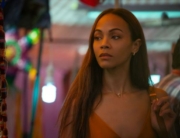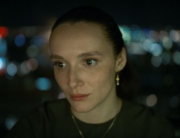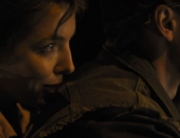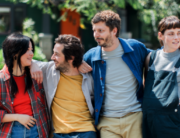Our Children begins in tragedy. A tearful mother in a Belgian hospital gasps out, “Bury them in Morocco,” and four tiny coffins are then transported up in a row onto an airplane. Writer/director Joachim Lafosse challengingly takes the anti-CNN approach to a horrific crime, uncomfortably flashing back to consider how complicated, claustrophobic circumstances could drive a beautiful, blonde young teacher to infanticide.
The first step Murielle (Émilie Dequenne) takes down this chilling path, inspired by a news story, is to fall in love with Mounir (Tahar Rahim) and to accept his marriage proposal. But first he seeks the approval of the man who brought him over from Morocco, Dr. André Pinget (Niels Arestrup, in a reteaming of the two actors as a psychological father/son after their violent pairing in Jacques Audiard’s A Prophet in 2009.) For Murielle, André not only seems like a father-in-law figure, he’s also the mentor grooming medical trainee Mounir to take over his practice. André, though, objects to the engagement, looking down upon it as a distraction from his protégé’s career plans. Mounir awkwardly bobs and weaves around this personal and professional paternalism by bringing his wife and mentor closely, and uncomfortably, together in their daily lives.
Previously Lafosse has delved into nuclear families going over the edge, such in Private Property (2006), and mentors crossing lines in Private Lessons (2008). He adds a too-post-colonial grip of dependency to the real-life incident, particularly in how the doctor controls Mounir’s life. His brother Samir (Redouane Behache), who’s anxiously waits for immigration sponsorship, implies that the doctor’s initial interest in Mounir was sexual. Murielle, thus, can be seen as a buffer for him against the doctor’s demands, especially since Mounir’s sister Fatima has a paper marriage to André—Mounir first came to Europe as his brother-in-law.
In the midst of these tensions, Murielle responds to her mother-in-law as the mother she never really had, and blooms at her prediction “You’ll have beautiful children.” She will continue to cling to her present, a colorful traditional garment, as a symbol of the strength of maternal love.
As each baby daughter is born, one after the other, practically one a year, Murielle keeps trying to go back to work, and the couple’s relationship with the doctor becomes more and more complicated and obsessive when he insists on buying a house they can all share, not that they will have much more privacy. (André’s even her obstetrician.) Murielle’s exhaustion gradually develops into postpartum depression. With the voyeuristic camera angles always filmed from the outside looking in, her anguish seems triggered from emotional claustrophobia when she desperately fixates on taking the girls to what she sees as freedom in Morocco, and away from André, even as the doctor rails about the limited options for the girls in a Muslim country.
The film is as upsetting as it is suspenseful in trying to make the unfathomable credible within this very specific extended family. It convincingly portrays how helplessly passive the indebted Mounir is to André, how unrelentingly dominating the doctor can be, and how Murielle feels closed off with fewer and fewer options. Though the disturbing (unseen) outcome is excruciatingly difficult to sympathize with, the film is nuanced and thoughtful.







Leave A Comment